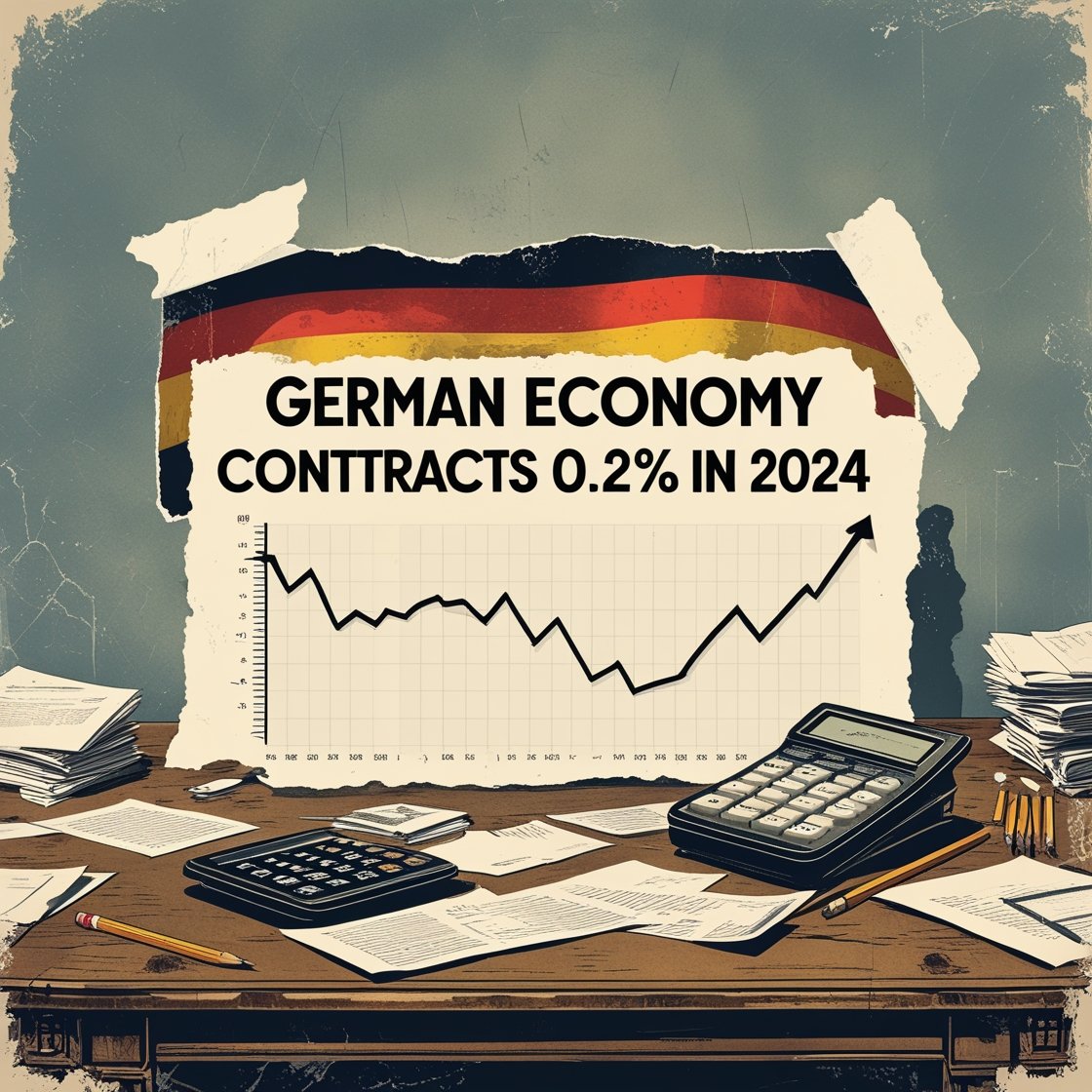The German economy, often seen as the powerhouse of Europe, contracted by 0.2% in 2024, marking its second consecutive year of decline. This slowdown has set off alarm bells across Europe, with analysts scrambling to decipher the causes and implications for the broader Eurozone.
This blog unpacks the factors behind Germany’s recent economic performance, how the contraction is impacting its industries and citizens, and what this could mean for global markets.
Why is the German Economy Slowing Down?
Economic slowdowns are rarely caused by a single factor, and Germany’s case is no exception. The recent 0.2% contraction in 2024 results from a combination of domestic and international factors—some structural, others cyclical.
1. The Hangover from 2023’s Energy Crisis
Germany’s economy was extremely vulnerable to the global energy crisis triggered by geopolitical tensions in 2023. With a heavy reliance on energy imports—particularly natural gas—Germany faced heightened energy prices that dented consumer spending and industrial production.
Efforts to transition to renewable energy sources have mitigated some risks but haven’t been rapid enough to prevent short-term damage. Manufacturing, a core pillar of Germany’s economy, has been particularly affected by the rising costs of energy-intensive production methods.
2. Weak Global Trade
Germany—a nation whose exports account for nearly 47% of its GDP—has long benefited from favorable global trade dynamics. However, with global trade growth slowing due to inflation, international tension, and shifting supply chains, Germany’s export-heavy economy has struggled to keep pace.
Major trading partners like China and the United States have seen slowing demand for goods, further impacting German exports of machinery, automobiles, and industrial tools.
3. Declining Industrial Output
Germany’s manufacturing sector, often referred to as the backbone of the economy, has been on a decline. Key industries like the automotive sector, despite leading innovations in electric vehicles, have contended with decreased global demand and intensified competition from China and the United States.
The fallout from chip shortages and supply chain disruptions, coupled with the rising costs of labor, are additional burdens industrial players have struggled to overcome.
4. Consumer Confidence Wanes
Inflation and rising interest rates across Europe have significantly reduced German consumers’ purchasing power. Retail sales have fallen, and housing markets have cooled as households attempt to tighten their belts.
With consumers spending less, businesses have scaled back production, creating a ripple effect throughout the economy.
—-
How This Impacts Industries Within Germany
Germany’s economic contraction isn’t just a number—it tells a larger story of how industries, businesses, and individuals are all feeling the pinch.
Automotive Industry
Traditionally a leader in the global auto market, German automakers like Volkswagen and BMW are grappling with slowed international demand. Despite strong commitments to EV (electric vehicle) transitions, production costs have risen while competition from lower-cost Asian manufacturers has intensified.
Manufacturing Sector
Machinery and equipment production, historically one of Germany’s top strengths, is experiencing a drop in both domestic and international demand. German manufacturers are adopting automation and AI-driven solutions to counter rising labor costs, but these transitions require time and significant investment.
The Energy Sector
Efforts to move towards renewables have seen progress, but the transition has not yet been smooth. Investments in wind and solar energy are widespread but insufficient to offset the economic strain caused by high fossil fuel costs during 2023.
Small and Medium Enterprises (SMEs)
SMEs make up the backbone of Germany’s economy, contributing more than 50% of its GDP. However, these businesses have been disproportionately affected by rising input costs, reduced domestic demand, and tighter credit conditions.
—-
The Broader Implications for Europe and the World
Germany’s economic performance often acts as a bellwether for the broader European Union. A slowdown in the region’s largest economy has implications that ripple across the Eurozone and beyond.
Impact on the Eurozone
The Eurozone may struggle to maintain stability if Germany continues to contract. Countries that rely on German exports—such as Poland, the Czech Republic, and Hungary—could feel knock-on effects. Additionally, Germany’s financial contributions to EU-wide initiatives and programs could be reduced, affecting the bloc’s broader ambitions.
Global Supply Chains
Industries that rely on high-precision German machinery and parts may face disruptions. If German exports continue to decline, businesses across North America and Asia could be forced to find alternative suppliers, reshaping global trade networks.
Risk of Recession
If Germany cannot reverse its economic trajectory, it risks sliding into a deeper recession—one that could reverberate across international markets and financial systems.
—-
Is There a Road to Recovery?
While the picture may seem grim, Germany has always been a country that thrives on resilience. Economic leaders and policymakers are already exploring measures to pull the economy out of its slump.
Boosting Export Competitiveness
Germany is expected to double down on innovation in industries like green energy, AI, and advanced manufacturing to maintain its competitive edge. By investing in R&D and fostering partnerships with emerging economies, Germany could seek to stay relevant in a rapidly shifting global economy.
Addressing Consumer Spending
Implementing policies to restore consumer confidence—such as tax breaks or targeted subsidies—could reinvigorate the German domestic economy.
Energy Independence
Accelerating the transition to renewable energy will be a top priority. Achieving greater energy independence could shield the economy from future global energy shocks.
Investing in Skilled Labor
Germany’s emphasis on education and workforce development needs to be reinforced further, especially in fields such as data science, engineering, and renewable energy. A skilled workforce will be critical to paving the way for economic revitalization.
—-
What This Means for You
Germany’s economic contraction serves as both a warning and a lesson for businesses, investors, and policymakers worldwide. It highlights the importance of adaptability in the face of global challenges and emphasizes the need for long-term investments in innovation and sustainability.
For individuals and organizations operating within or relying on German markets, it’s essential to stay informed about upcoming policy changes and global trade adjustments. Whether you’re part of a multinational corporation or a startup, the key takeaway is clear—preparing for economic turbulence today will lead to resilience tomorrow.

